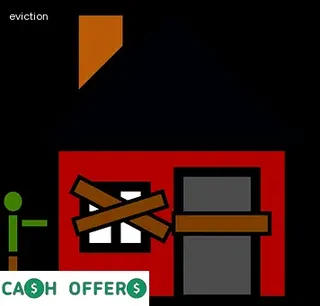Under Rhode Island law, landlords and tenants both have certain rights and responsibilities. Tenants are entitled to a habitable living space, while landlords are expected to provide essential services such as heat and hot water, repair any damage in a timely manner, and allow the tenant access to their premises.
The eviction process in Rhode Island can take anywhere from two weeks to several months depending on the situation. In some cases, if the tenant is unable or unwilling to pay rent or violates other provisions of the lease agreement, a landlord is able to begin eviction proceedings immediately.
If the tenant contests the eviction and requests a hearing before a judge, however, then it may take longer for the process to be completed. In addition, if a court ultimately rules in favor of an eviction, there is still an additional waiting period for the tenant to move out before any legal action can be taken against them.

Eviction laws in Rhode Island vary depending on the type of lease agreement between the tenant and landlord. A fixed term tenancy requires a 30-day notice to vacate, while a periodic tenancy requires a 20-day notice.
Tenants may also be evicted for reasons such as nonpayment of rent, violation of terms in the rental agreement, or other illegal activities. The eviction process begins when the landlord serves the tenant with a summons and complaint by certified mail, which details the reason for the eviction.
The tenant then has 10 days to respond to the summons. Once this time period has expired, the court will determine if an eviction hearing is necessary.
If so, a judge will hear both parties’ arguments and make their ruling within 48 hours of the hearing. Depending on if an appeal is filed by either party, it can take anywhere from two weeks to two months for an eviction order to be issued.
Just cause evictions are those that require a landlord to provide proof of an action or behavior by the tenant that justifies the eviction. This can include nonpayment of rent, violation of the rental agreement, illegal activity on the property, or other reasons in which the tenant has failed to uphold their obligations.
A just cause eviction must be properly documented and follow all applicable laws and regulations in order for it to be valid. In Rhode Island, landlords must give tenants written notice before beginning the eviction process, and any legal proceedings will be handled through court.
Depending on the severity of the situation, how quickly it is resolved in court, and other factors involved, this process can take anywhere from a couple of weeks to several months.

In Rhode Island, a landlord can file an eviction notice when a tenant has failed to pay their rent or violated the terms of their rental agreement. A landlord must provide written notice to the tenant and wait for the period of time specified in the rental agreement before beginning the eviction process.
Generally, this time frame is 10 days for unpaid rent and 20 days for other violations. If the tenant fails to meet the requirements of the notice within that time frame, then a landlord may file an eviction complaint with the local court system.
The court will then decide whether or not to issue an eviction order after hearing both sides of the case.
The legal steps of an eviction process typically involve several key elements. First, a landlord must provide the tenant with a written notice to vacate the property.
Depending on the reason for the eviction, this notice period can range from 10 days up to one month. If the tenant does not comply with the notice, then the landlord has cause to file a complaint in Rhode Island Housing Court.
This involves providing documentation of rental payments and other relevant information. The court will then set a hearing date which is usually within 5-7 days of filing the complaint.
During this time, if payment arrangements have been made, it may be possible to avoid eviction altogether. If not, then after hearing both sides at the court hearing, the judge will decide whether or not to allow for eviction proceedings to begin.

In Rhode Island, evictions can be caused by a variety of factors. These can include not paying rent on time, violating the terms of the lease, damaging the property, having unauthorized occupants in the rental unit, or engaging in illegal activities.
The landlord may also choose to evict a tenant if their plans for the property change and they no longer need it to be rented out. In any case where a tenant has not met their obligations under the lease agreement, the landlord has the legal right to take action and begin the eviction process.
It's important for tenants in Rhode Island to understand their rights and responsibilities when renting an apartment or house so that they can avoid potential eviction proceedings.
The Rhode Island eviction process requires several documents to file an eviction complaint. The documents needed typically include a Notice to Quit, a Summons and Complaint, a Writ of Possession (if the tenant does not move out), and an Affidavit of Service.
Each document must be filed with the court in order for the court to move forward with the eviction process. Additionally, landlords must make sure that all required information is included in each document and that it is properly filled out before filing with the court.
By ensuring that all necessary documents are filed correctly, landlords can help speed up the Rhode Island eviction process and get their property back as soon as possible.

Notifying a tenant of their breach of the lease agreement is an essential step in the Rhode Island eviction process. Landlords must provide tenants with a written notice to comply with the terms of the lease agreement, typically within 30 days.
This notice should be delivered via certified mail or hand-delivered by a witness with proof of delivery. If the tenant fails to comply with the lease agreement, then landlords may proceed to file an eviction lawsuit in court.
It is important for landlords to understand that there is no “one size fits all” approach when it comes to evicting tenants and that they should familiarize themselves with local laws and regulations. Additionally, landlords should take into consideration that the Rhode Island eviction process usually takes between one and three months from start to finish.
Serving the tenant with an eviction notice is one of the first steps in the Rhode Island eviction process. The landlord must provide a written notice detailing why the tenant is being evicted and how much time they have to move out.
In Rhode Island, if a tenant has not paid rent, they must be served with a seven-day Notice to Quit; however, if the issue is for something other than unpaid rent, such as lease violation or illegal activity, then the landlord must give them 30 days’ notice. The landlord can serve this notice either by delivering it directly to the tenant or by posting it on their door.
After this step has been completed, either party can take legal action against the other in court. It is important that landlords understand the entire process before beginning an eviction as it can take weeks or months to complete depending on whether or not they are able to get a hearing date and what happens during that hearing.

Asking for possession of property in Rhode Island is an important step in the eviction process. It is important to understand that each case is unique and has its own timeline, but there are generally accepted steps that must be taken.
First, a landlord must initiate the eviction process by filing a summons and complaint in the appropriate district court. After that, the tenant will receive notice of the eviction action and has a certain number of days to respond.
If they do not respond, then a judgment of possession can be entered against them. The next step is for the landlord to file a motion for possession with the court, which will set a date for it to be heard by the court.
If granted, this will give the landlord immediate possession of their property. Lastly, if necessary, law enforcement may need to be contacted in order to enforce an eviction order and help remove any tenants who have not voluntarily vacated the premises.
Once a court hearing has been conducted and the judgment has been made in favor of the landlord, the eviction process in Rhode Island can move fairly quickly. Depending on the situation, the tenant may need to vacate the premises within three days or up to 10 days after a judgment is entered.
A Writ of Possession from the court is required for a landlord to legally gain possession of their rental property. If this document is not obtained, it could result in delays that may keep landlords from taking back their property as soon as possible.
In some cases, law enforcement officers are also required to be present when evicting a tenant. The landlord should communicate with local law enforcement prior to attempting an eviction as they may have specific requirements for this process.
Once all steps have been taken and all documents have been filed, landlords can expect to receive possession of their property in accordance with Rhode Island law.

When it comes to the Rhode Island Eviction Process, it is important to be prepared to provide evidence in court. As a tenant, you must demonstrate why you should not be evicted and how you are willing to pay rent or make up for any other violations that have occurred.
The first step is to collect all relevant documents that prove your case. This includes proof of payment, letters from witnesses, and other forms of documentation that support your argument.
Additionally, tenants should also prepare a statement explaining their circumstances and providing evidence of financial hardship or other extenuating circumstances if applicable. Lastly, bringing photos or videos as evidence can be helpful in establishing your case.
Ultimately, presenting compelling evidence during the court hearing could help sway the judge's decision in your favor and allow you to remain in your home.
The Rhode Island eviction process can take several weeks or even months, depending on the situation. During this time, it is important to explore all available alternatives such as mediation services, legal assistance programs and tenant rights resources.
Mediation services are a great way to resolve conflicts between landlords and tenants without having to go through the formal eviction process. Legal assistance programs can provide access to free legal advice so that tenants know their rights and responsibilities when facing an eviction.
Additionally, there are many tenant rights resources available online that can provide valuable information about the laws in Rhode Island and how they apply to evictions. It's important for tenants to understand their rights during the eviction process so that they can make informed decisions about their living situation.

It is important to understand the facts about illegal lockouts and squatter's rights when considering the length of Rhode Island's eviction process. Illegal lockouts, which occur when a landlord or other person changes the locks on a tenant’s door, are strictly prohibited in Rhode Island and can result in landlords facing serious legal consequences.
Additionally, squatters' rights allow occupants of a property to gain legal ownership if they live in a property without permission for more than 20 years. Although it is important to be aware of laws regarding illegal lockouts and squatters' rights, these laws do not affect the length of time it takes for an eviction process to be completed in Rhode Island.
In most cases, the eviction process usually takes between one to three months from start to finish.
The eviction process in Rhode Island (RI) can vary depending on the situation, but generally speaking it is a long and complicated process. It typically takes from two to three months from the initial filing of paperwork by a landlord until an actual eviction occurs.
This is longer than many other states, making it important for tenants to know their rights and understand the process. Comparing RI's eviction process with other states can help tenants better understand what they may be up against when facing an eviction.
Additionally, there are several frequently asked questions about RI evictions that tenants should be aware of, such as will they be notified before being locked out? And what are their rights in terms of court cases involving landlords and tenants? Lastly, there are various free downloads available for those facing an eviction which can provide helpful information and resources.
In Rhode Island, the rules of eviction require that a landlord provide written notice to a tenant before initiating an eviction. The length of notice given depends on the lease agreement, with most leases requiring at least 30 days.
In cases where the tenant has not paid rent or has violated other terms of the contract, landlords are required to give 14 days notice. The notice must contain information about why the landlord is seeking to evict and must be personally delivered or sent by certified mail.
If the tenant does not move out after receiving this notice, then the landlord can file an eviction lawsuit in court. As part of this process, a judge will determine whether the eviction is justified and order either that the tenant must leave or allow them to remain in place while they catch up on any missed payments.
Depending on individual circumstances, the Rhode Island eviction process can take anywhere from two weeks to several months.

Delaying an eviction in Rhode Island can be a challenging process. Depending on the complexity of the case, it is possible to delay an eviction for a short time period while landlords and tenants resolve their issues.
In order to delay an eviction, tenants should contact their landlord as soon as possible to explain the situation and work out any payment arrangements that may be necessary. Additionally, tenants can file a motion in court to request additional time during the eviction process.
This motion must be filed within seven days of being served with an eviction notice. A judge will then determine whether or not to grant a delay and set up a hearing date if appropriate.
It is important that tenants appear at this hearing to explain why they need more time before being evicted from their home. If granted, the judge may postpone the eviction for up to two weeks or more depending on the circumstances of each case.
Ultimately, it is up to the discretion of the judge when deciding how long of a delay will be given for an eviction in Rhode Island.
In Rhode Island, evictions stay on your record for up to 7 years. During this time, landlords and property management companies may use it as a factor when considering a prospective tenant’s application.
It is important to understand that an eviction does not just impact your ability to rent in Rhode Island; it can also affect your credit score and future housing opportunities outside of the state. It is important to take proactive measures after an eviction, such as looking into rental assistance programs and working with landlords who may be willing to overlook past issues.
Additionally, many states have laws that allow tenants to have their records expunged after a certain amount of time or under certain criteria. Before signing any new leases, renters should review their state’s laws concerning eviction history and look into ways they can potentially remove the eviction from their record.
In Rhode Island, the 30 day notice to vacate is an important part of the eviction process. This document serves as a written warning to tenants that their lease will be terminated in 30 days or less.
This notice must be properly served to the tenant for it to be legally valid. The tenant has the right to dispute this notice within 10 days after it has been served.
If the landlord still wishes to proceed with eviction, they must then file a complaint in court and attend a hearing before a judge. If a judgment is issued in favor of the landlord, the tenant must vacate within 30 days or less.
It is important for landlords and tenants alike to understand their rights and responsibilities during this process in order to ensure that it goes smoothly and that both parties are treated fairly.
A: The eviction process in Rhode Island typically takes between two to three months. This timeline includes steps such as serving the tenant with an Eviction Notice, filing a Complaint in court, attending a court hearing, and obtaining a Writ of Possession. The exact length of time depends on several factors including whether or not the tenant contests the eviction and how quickly the court is able to hear the case. Additionally, there are certain legal requirements that must be met for an eviction to be valid in Rhode Island.
A: The eviction process in Rhode Island typically takes between 3-5 weeks to complete, depending on the individual circumstances of each case.